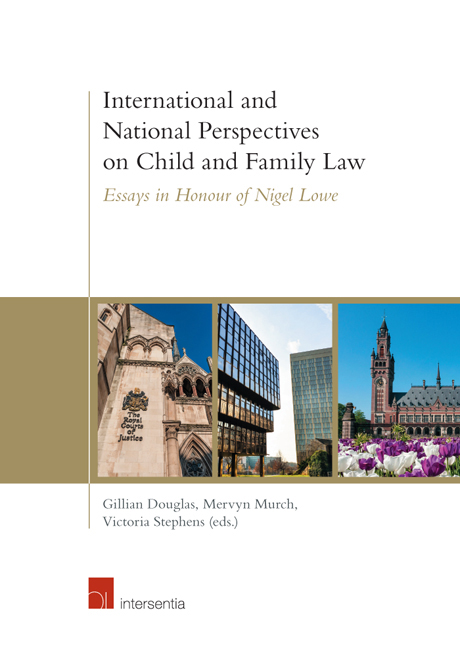Book contents
- Frontmatter
- Foreword
- Acknowledgements
- Contents
- List of Cases
- List of Contributors
- Introduction: Nigel Vaughan Lowe: An Appreciation
- Part I Family and Child Law in England and Wales
- Part II International Family Law
- Part III The Future for Family and Child Law
- The Hague Child Abduction Convention in a Changing World
- Using Research to Improve Outcomes for Abducted Children
Breaking the Existing Paradigms of Parent–Child Relationships
from Part III - The Future for Family and Child Law
Published online by Cambridge University Press: 12 October 2018
- Frontmatter
- Foreword
- Acknowledgements
- Contents
- List of Cases
- List of Contributors
- Introduction: Nigel Vaughan Lowe: An Appreciation
- Part I Family and Child Law in England and Wales
- Part II International Family Law
- Part III The Future for Family and Child Law
- The Hague Child Abduction Convention in a Changing World
- Using Research to Improve Outcomes for Abducted Children
Summary
It is a great honour and great pleasure to contribute to this Festschrift for Nigel Lowe. To the family law community of the United Kingdom he has long been known as one of the outstanding family lawyers of his generation and co-author of the most comprehensive family law textbook, Bromley's Family Law. But what many family lawyers from these isles may not know is that on the Continent, he is the English family lawyer. Through his comparative and international work, particularly for the Council of Europe and the Commission on European Family Law, he was (and still is) representing the family law of England and Wales in Europe – and beyond. His importance in this cannot be overstated. Anyone working on comparative or international family law with an interest in English family law knows Nigel or at least knows of Nigel, and certainly has read his work. Therefore, I am delighted to contribute this chapter to this volume in honour of England and Wales’ ‘Mr. Family Law’.
IN THE BEGINNING THERE WERE TWO, AND THEY WERE MARRIED – AND NOW?
Family law for a long time was only centred on one particular family unit: a man and a woman, united in (indissoluble) marriage. Marriage was the proper framework for having children, and therefore this was where proper parent – child relationships were created, meaning that each child legally had one mother and one father.
But we now live in the twenty-first century. Today we live in a world where marriages oft en end in divorce; where an increasing number of children grow up in families that do not conform to the ‘traditional’ view of what a family is; where categories of gender are not as fixed as they used to be; where persons legally classified as men can give birth to children; where some persons are not legally classified as male or female; where children are not necessarily genetically related to (all) their legal parents and indeed may have three genetic parents, and even more social parents. The law has been too slow to react to societal changes (on which see section 2 below) and medical advances (on which see section 3 below), and these issues need to be dealt with as a matter of urgency.
- Type
- Chapter
- Information
- International and National Perspectives on Child and Family LawEssays in Honour of Nigel Lowe, pp. 343 - 359Publisher: IntersentiaPrint publication year: 2018
- 2
- Cited by



